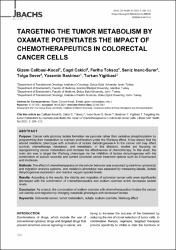Targeting the tumor metabolism by oxamate potentiates the impact of chemotherapeutics in colorectal cancer cells

Göster/
Erişim
info:eu-repo/semantics/openAccessTarih
2021Yazar
Çalıbaşı Koçal, GizemÇakıcı, Çağrı
Toksöz, Feriha
İnanç Sürer, Seniz
Sever, Tolga
Başbınar, Yasemin
Yiğitbaşı, Türkan
Üst veri
Tüm öğe kaydını gösterKünye
Çalıbaşı Koçal, G., Çakıcı, Ç., Toksöz, F., İnanç Sürer, S., Sever, T., Başbınar, Y. ... Yiğitbaşı, T. (2021). Targeting the tumor metabolism by oxamate potentiates the impact of chemotherapeutics in colorectal cancer cells. Journal of Basic and Clinical Health Sciences, 5(3), 205-212. https://dx.doi.org/10.30621/jbachs.988996Özet
Purpose: Cancer cells promote lactate formation via pyruvate rather than oxidative phosphorylation by programming their metabolism to maintain proliferation under the Warburg effect. It has shown that the altered metabolic phenotype with activation of lactate dehydrogenase-A in the cancer cell may affect survival, chemotherapy resistance, and metastasis. In this direction, studies are focusing on reprogramming cancer metabolism and increase the effectiveness of chemotherapy. In this study, the main aim was to target the Warburg phenotype via the inhibition of lactate dehydrogenase with the combination of sodium oxamate and current colorectal cancer treatment options such as 5-fluorouracil and irinotecan.
Methods: The effect of chemotherapeutics on the cellular behavior was evaluated by real-time cytotoxicity and migration analysis systems, and metabolic phenotype was assessed by measuring lactate, lactate dehydrogenase expression, and reactive oxygen species levels.
Results: According to the results, the viability and migration of colorectal cancer cells were significantly decreased with the combination of chemotherapeutics and sodium oxamate which decreases lactate levels.
(C)onclusion: As a result, the combination of sodium oxamate with chemotherapeutics hinders the cancer cell viability and migration by changing metabolic phenotype with decreased lactate.
Kaynak
Journal of Basic and Clinical Health SciencesCilt
5Sayı
3Koleksiyonlar
- Makale Koleksiyonu [3777]
- TR-Dizin İndeksli Yayınlar Koleksiyonu [2177]
- WoS İndeksli Yayınlar Koleksiyonu [6631]

















